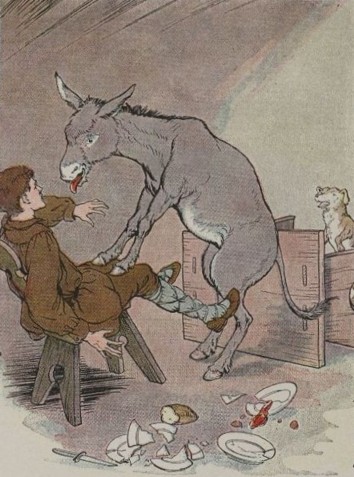| 1. frisk | /FRISK/ |
| -to move around in a happy, energetic way | |
| The hamster is frisking upon seeing his food. | |
| 2. discontent | /dis-kuhn-TENT/ |
| -a feeling of wanting better treatment or an improved situation | |
| There were murmurs of discontent about his speech. | |
| 3. eagerly | /EE-ger-lee/ |
| -in a way that shows that you want to do or have something very much, especially something interesting or enjoyable | |
| We must eagerly welcome new opportunities provided by digital technology. | |
| 4. prance | /PRAHNS/ |
| -to walk in an energetic way and with more movement than necessary | |
| The singer is well-known to prance about the stage while performing. | |
| 5. mourn | /MAWRN/ |
| -to feel or express great sadness, especially because of someone’s death | |
| Followers had traveled many miles to mourn the loss of their leader. |

All this the Ass saw with much discontent. Though he was well fed, he had much work to do; besides, the Master hardly ever took any notice of him.
Now the jealous Ass got it into his silly head that all he had to do to win his Master’s favor was to act like the Dog. So one day he left his stable and clattered eagerly into the house.
Finding his Master seated at the dinner table, he kicked up his heels and, with a loud bray, pranced giddily around the table, upsetting it as he did so. Then he planted his forefeet on his Master’s knees and rolled out his tongue to lick the Master’s face, as he had seen the Dog do. But his weight upset the chair, and Ass and man rolled over together in the pile of broken dishes from the table.
The Master was much alarmed at the strange behavior of the Ass, and calling for help, soon attracted the attention of the servants. When they saw the danger the Master was in from the clumsy beast, they set upon the Ass and drove him with kicks and blows back to the stable. There they left him to mourn the foolishness that had brought him nothing but a sound beating.
Behavior that is regarded as agreeable in one is very rude and impertinent in another. Do not try to gain favor by acting in a way that is contrary to your own nature and character.
| 1. | What did the Ass do after being jealous of the Lap Dog? |
| 2. | What did the servants do after seeing the Ass’ mess? |
| 3. | What is the lesson of the story? |
| 1. | Do you think that the behavior of the Ass is justifiable? Why or why not? |
| 2. | In your opinion, what should the Master do next time to avoid jealousy between the two animals? |
| 3. | How do you avoid jealousy? |
| 4. | Do you agree with the lesson of the story? Why or why not? |
| 5. | Have you experienced something similar to the fable’s lesson? Please tell more about it. |
| Grammar 文法 |
Pronunciation 発音 | Vocabulary 単語 |
Comprehension 理解 |
|
|---|---|---|---|---|
 GOOD GOOD |
文法の誤りはほとんどなく、完全な文章で話すことができる | ほとんどの単語をはっきりと正しく発音することができる | 習った表現を適切に使うことができる | 文章を理解し、質問に正しく答えることができる |
 FAIR |
文法の誤りはあるが、完全な文章で話すことができる | 発音の練習が必要な言葉がいくつかある | たまにミスはあるが、習った表現を適切に使うことができる | 文章を完全に理解するのは難しく、質問に正しく答えられないときもある |
 POOR |
文章で話すのは難しく、単語だけで話すことができる | 発音の練習が必要である | 習った単語と表現を少しだけ使うことができる | 文章を理解するのは難しく、質問に答えるのは難しい |
An eBook from The Project Gutenberg.
This eBook is for the use of anyone anywhere at no cost and with almost no restrictions whatsoever. You may copy it, give it away or re-use it under the terms of the Project Gutenberg License included with this eBook or online at www.gutenberg.org